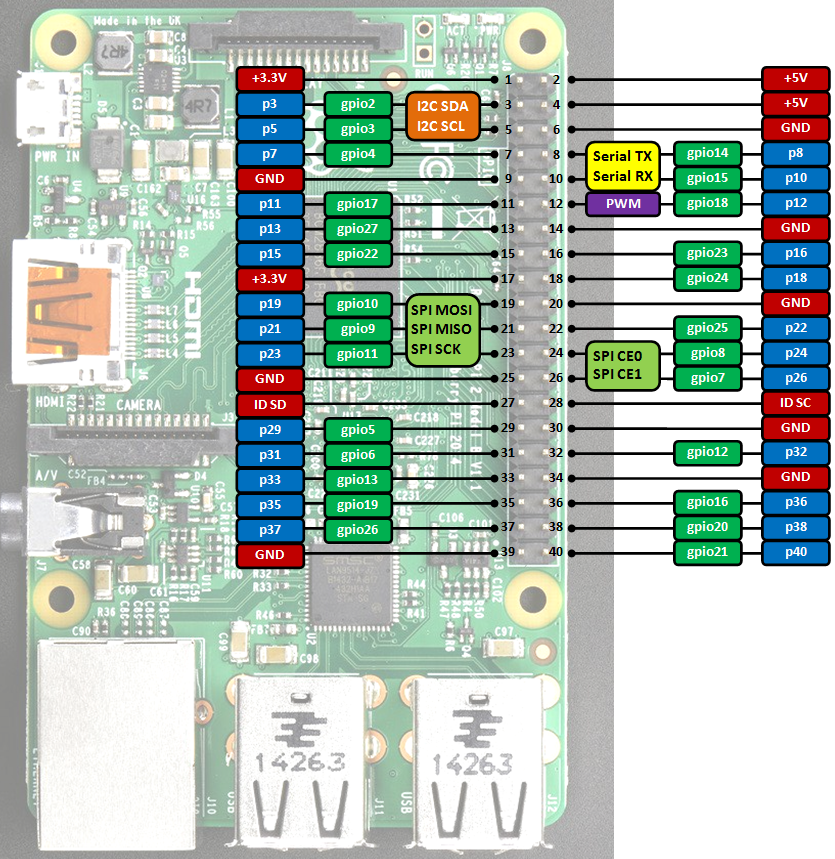mbed API for Raspberry Pi boards.
mbedPi
This is an attempt to implement a limited number of mbed APIs for Raspberry Pi single-board computers. The project was inspired by and based on the arduPi library developed for the Arduino by Cooking Hacks .
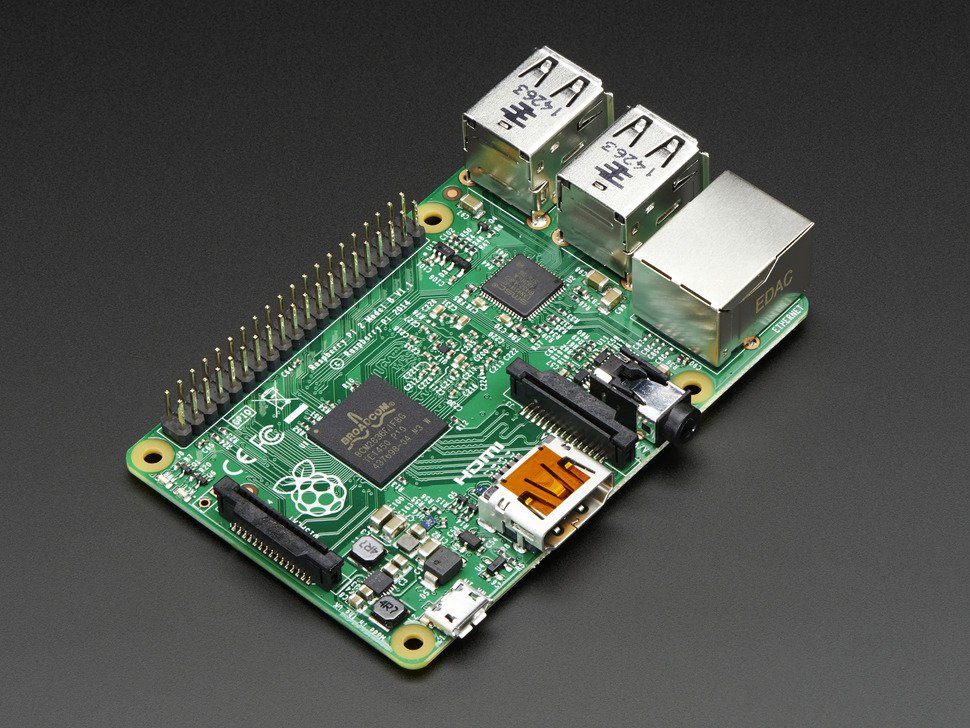
Specifications
- Chip: Broadcom BCM2836 SoC
- Core architecture: Quad-core ARM Cortex-A7
- CPU frequency: 900 MHz
- GPU: Dual Core VideoCore IV® Multimedia Co-Processor
- Memory: 1GB LPDDR2
- Operating System: Boots from Micro SD card, running a version of the Linux operating system
- Power: Micro USB socket 5V, 2A
Connectors
- Ethernet: 10/100 BaseT Ethernet socket
- Video Output: HDMI (rev 1.3 & 1.4)
- Audio Output: 3.5mm jack, HDMI
- USB: 4 x USB 2.0 Connector
- GPIO Connector: 40-pin 2.54 mm (100 mil) expansion header: 2x20 strip providing 27 GPIO pins as well as +3.3 V, +5 V and GND supply lines
- Camera Connector: 15-pin MIPI Camera Serial Interface (CSI-2)
- JTAG: Not populated
- Display Connector: Display Serial Interface (DSI) 15 way flat flex cable connector with two data lanes and a clock lane
- Memory Card Slot: Micro SDIO
GPIO connector pinout
Information
Only the labels printed in blue/white or green/white (i.e. p3, gpio2 ...) must be used in your code. The other labels are given as information (alternate-functions, power pins, ...).
Building programs for the Raspberry Pi with mbedPi
I use Qt Creator for development, however you can use any other IDE available on the Raspberry Pi (e.g. Geany) if you like. For a quick try:
- Install Qt and the Qt Creator onto your Raspberry Pi. Then create a new "Blinky" Plain non-Qt C++ Project as follows:
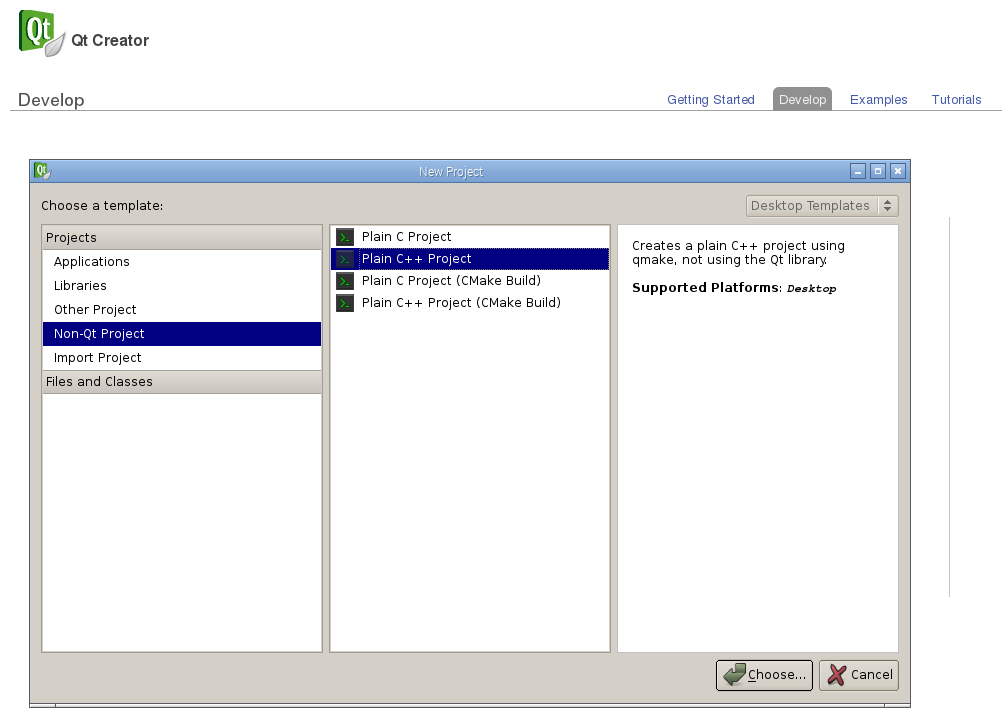
- Change the main code as below:
main.cpp
#include "mbedPi.h"
int main()
{
DigitalOut myled(p7);
while(1) {
myled = 1; // LED is ON
wait(0.2); // 200 ms
myled = 0; // LED is OFF
wait(1.0); // 1 sec
printf("Blink\r\n");
}
}
- Copy the mbedPi.zip file into your project's folder and unzip.
- Add the mbedPi.h and mbedPi.cpp files to your project by right clicking on the "Blinky" project and then clicking on the "Add Existing Files..." option in the local menu:
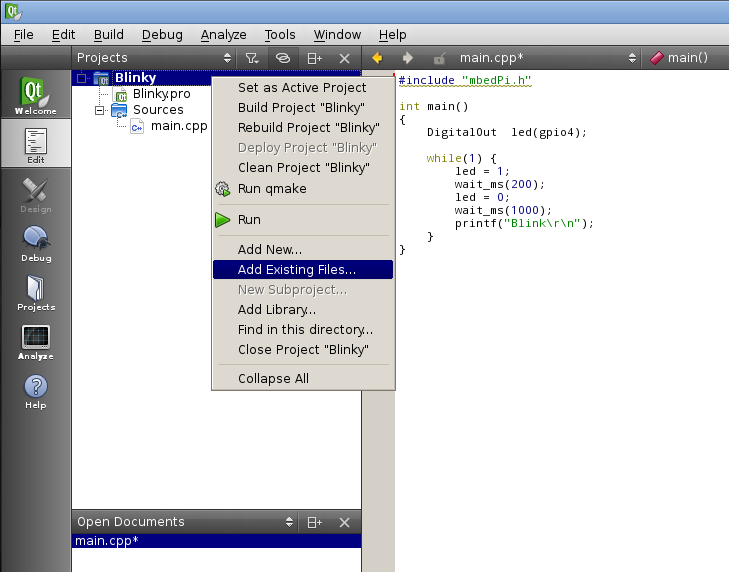
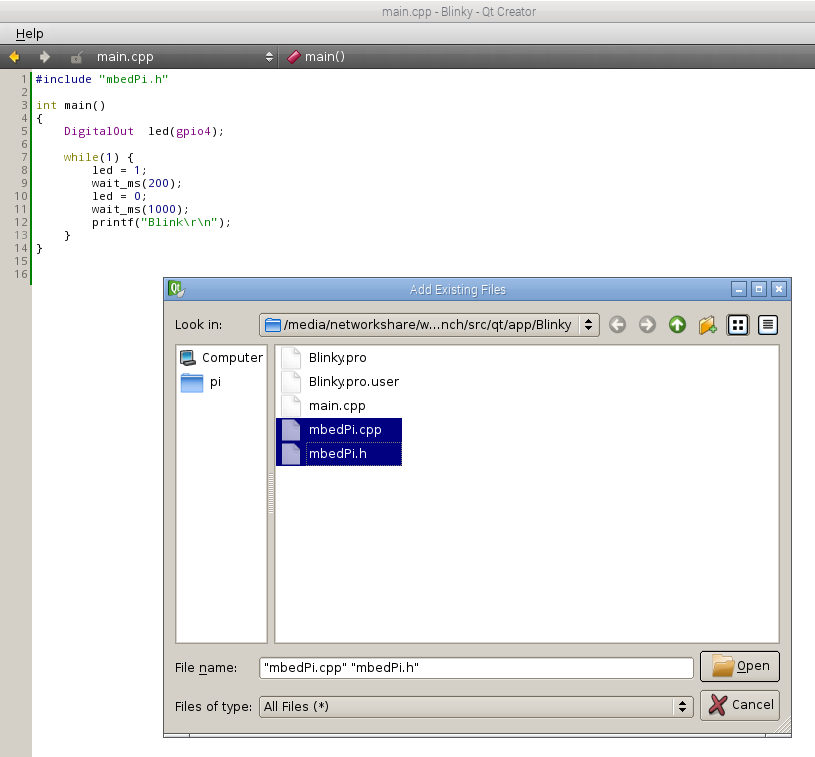
- Double click on Blinky.pro to open it for editing and add new libraries by inserting a new line as follows:
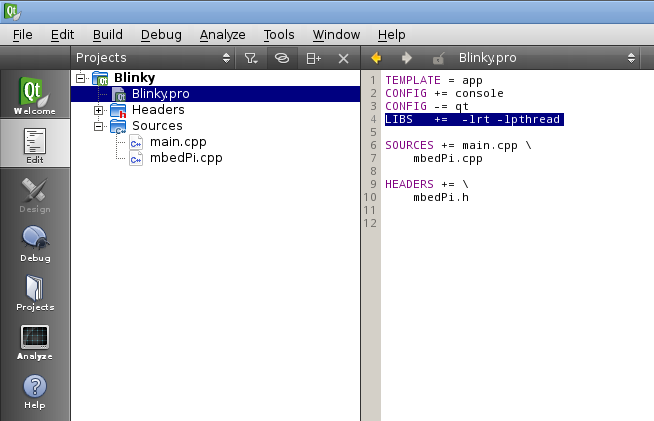
- Compile the project.
- Connect an LED through a 1k resistor to pin 7 and the ground on the Raspberry Pi GPIO connector.
- Run the binary as sudo (sudo ./Blinky) and you should see the LED blinking.

- Press Ctrl+c to stop running the application.
Diff: include/PinNames.h
- Revision:
- 1:1f2d9982fa8c
--- /dev/null Thu Jan 01 00:00:00 1970 +0000
+++ b/include/PinNames.h Tue Dec 20 12:08:07 2022 +0000
@@ -0,0 +1,111 @@
+#ifndef _PIN_NAMES_H_
+#define _PIN_NAMES_H_
+
+typedef enum {
+ // Not connected
+ NC = (int)0xFFFFFFFF,
+
+ // GPIO names
+ gpio2 = 2,
+ gpio3 = 3,
+ gpio4 = 4,
+ gpio5 = 5,
+ gpio6 = 6,
+ gpio7 = 7,
+ gpio8 = 8,
+ gpio9 = 9,
+ gpio10 = 10,
+ gpio11 = 11,
+ gpio12 = 12,
+ gpio13 = 13,
+ gpio14 = 14,
+ gpio15 = 15,
+ gpio16 = 16,
+ gpio17 = 17,
+ gpio18 = 18,
+ gpio19 = 19,
+ gpio20 = 20,
+ gpio21 = 21,
+ gpio22 = 22,
+ gpio23 = 23,
+ gpio24 = 24,
+ gpio25 = 25,
+ gpio26 = 26,
+ gpio27 = 27,
+
+ // Rapsberry Pi pin names
+ p3 = gpio2,
+ p5 = gpio3,
+ p7 = gpio4,
+ p8 = gpio14,
+ p10 = gpio15,
+ p11 = gpio17,
+ p12 = gpio18,
+ p13 = gpio27,
+ p15 = gpio22,
+ p16 = gpio23,
+ p18 = gpio24,
+ p19 = gpio10,
+ p21 = gpio9,
+ p22 = gpio25,
+ p23 = gpio11,
+ p24 = gpio8,
+ p26 = gpio7,
+ p29 = gpio5,
+ p31 = gpio6,
+ p32 = gpio12,
+ p33 = gpio13,
+ p35 = gpio19,
+ p36 = gpio16,
+ p37 = gpio26,
+ p38 = gpio20,
+ p40 = gpio21,
+
+ // Extension board V2.1 pin names
+ P0 = gpio17,
+ P1 = gpio18,
+ P2 = gpio27,
+ P3 = gpio22,
+ P4 = gpio23,
+ P5 = gpio24,
+ P6 = gpio25,
+ P7 = gpio4,
+ CE1 = gpio7,
+ CE0 = gpio8,
+ CS = gpio8,
+ SCLK = gpio11,
+ MISO = gpio9,
+ MOSI = gpio10,
+ RXD = gpio15,
+ TXD = gpio14,
+ SCL = gpio3,
+ SDA = gpio2,
+ PWM = gpio18,
+
+ // Arduino pin names on the Extension board V2.1
+ D2 = gpio18,
+ D3 = gpio23,
+ D4 = gpio24,
+ D5 = gpio25,
+ D6 = gpio4,
+ D7 = gpio17,
+ D8 = gpio27,
+ D9 = gpio22
+} PinName;
+
+typedef enum
+{
+ PIN_INPUT,
+ PIN_OUTPUT
+} PinDirection;
+
+typedef enum
+{
+ PullNone,
+ PullUp,
+ PullDown,
+ OpenDrain,
+ PullDefault = PullNone
+} PinMode;
+
+#endif // _PIN_NAMES_H_
